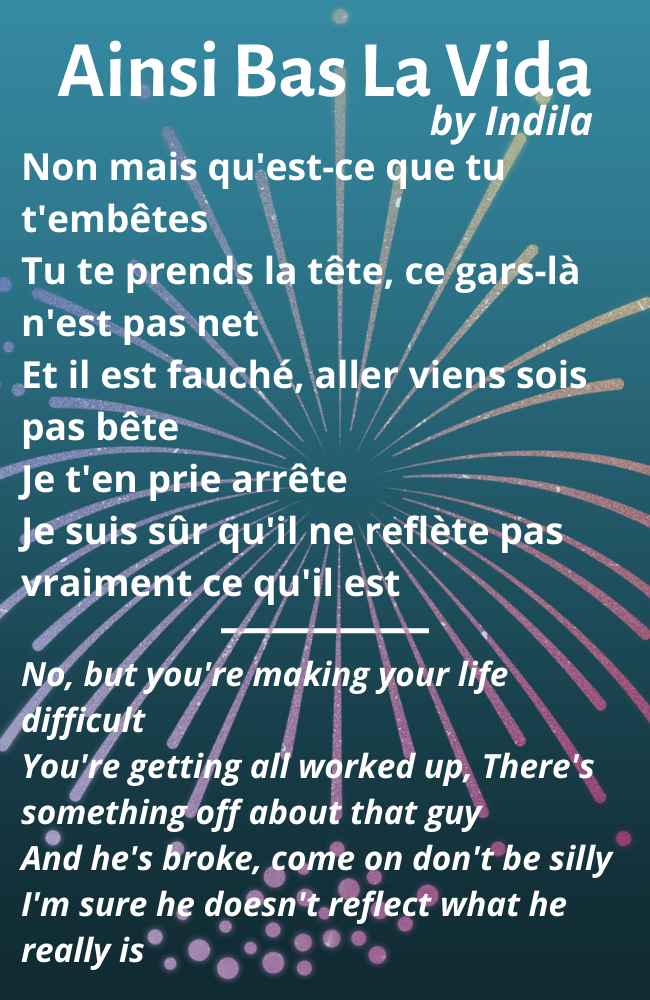
“Ainsi Bas La Vida” (meaning: Thus low is life; pronunciation ɛ̃si ba la vida) is a hit song by French singer Indila. Released in 2014 on the album Mini World, the song became an instant hit in Europe. In a nutshell, the song is about the singer having feelings for a man who’s mostly likely poor and not what he appears to be.
Ainsi Bas La Vida – song title meaning
There are several ways to translate the song title, “Ainsi Bas La Vida”. Our translation is “Thus low is life” . The word “ainsi“ has several translation including thus, in this way and so. The adjective “bas“ means low. The word “la vida” means “life” in Spanish or “la vie” in French.
Other translations of “Ainsi Bas La Vida” which we found online are “that’s how life lows” (literal translation on genius.com). A contributor on hinative.com suggested an alternative French title: “Ainsi va la vie” (that’s how life goes).
Lyrics analysis
In the following section we’ll take a close line-by-line look at the lyrics of Ainsi Bas La Vida and highlight specific vocabulary and grammar points of interest.
C’était un triste soir comme il y en a par milliers
This line translates to “It was a sad evening like one of thousands”. “C’était” is the imperfect tense of the verb être (to be). The imperfect is tense used to indicate “was” or “used to be”. This page on our site covers the imperfect and this page covers être in detail.
Quand cet homme est venu me voir pour parler
This line translates to “When a man came to see me to speak to me”. The word “quand“ means when in French. This page covers different ways to say “when”. “Est venu” is the passé composé (a French past tense) of the verb venir, which means to come. This page on our site covers the French passé composé in detail.
Et même s’il était tard, pour m’attendre et pour dîner
This line translates to “And even though it was late, to wait for me and to have diner”. “Même si“ is a conjunction that translates to “even if”. The word “pour” means both “for” as well as “in order to”. The “m'” on “m’attendre” is an object pronoun which means both “to me” and “at me”. This page on our site covers object pronouns in detail.
Je savais que c’était lui que j’attendais
This line translates to “I know he was the one I was waiting for”. The word “lui“ has two main usages in French. The first is an object pronoun meaning “to him/her” or “at him/her”. The second is a stressed pronoun. In this line, “lui” means “the one”. This page covers the various usages of “lui”.
Et je l’ai vu sourire
This line translates to “And I saw him smile”. The “l'” is a direct object pronoun meaning “him”. “Sourire“ is both the verb for “to smile” as well as the noun, “a/the smile”.
J’ai vu ses yeux me dire
This line translates to “I saw his eyes telling me”. “Vu” is the past participle of the verb “voir“, which means “to see”. The word for “eye” is interesting in French. In the singular form, “un oeil” is “an eye” and in the plural form, “les yeux” is “eyes.
Noyer dans un sourire, reste à mes cotés
This line translates to “Drowning in a smile, staying at my side”. The usage of the infinitive for “noyer” for
“to drown” is a French way of doing an “-ing” or present progressive tense. The word “côté“ has multiple translations, one of which is “side”.
J’ai pu sentir son cœur
This line translates to “I could feel his heart”. “Pu” is the participle for the verb “pouvoir”, which means “can” or “able to”. “J’ai pu” translates to both “I could” and “I was able to”. This page on our site covers the verb pouvoir in detail.
Vibrer à cent à l’heure
This line translate to “vibrating at one hundred an hour”. What it’s really referring to is “one hundred kilometers per hour”, which is a speed limit in Europe. The page covers expressions with “à l’heure“.
Et soudain j’ai pris peur quand je les entendais me dire
This line translates to “And suddenly I was scared when I heard them telling me”. “Prendre peur” translates literally to “to take fear” but really means “got scared” in the context of this line. “Les entendais” means “hear them” in the imperfect tense. The “les” is direct object pronoun, meaning “them”, not to be confused with the other “les” when is the plural of “the”.
Non mais qu’est-ce que tu t’embêtes
This line translates to “No, but you’re making your life difficult”. The verb “s’embêter“ translates to both to bother yourself and to be annoyed. In this context of this line and this song, it can be loosely translated to “make your life difficult”.
Tu te prends la tête, ce gars-là n’est pas net
This line translates to “You’re getting all worked up, There’s something off about that guy”. The expression “se prendre la tête“ translates to “to get all worked up”. The word “gars“ is slang for guy, boy and lad.
Et il est fauché, aller viens sois pas bête
This line translates to “And he’s broke, come on don’t be silly”. The word “fauché“ is slang for broke, as in not having any money. This page on our site covers French slang in detail. “Sois” is the imperative (commanding tense) of “être” (to be). This page on our site covers the imperative in detail. The adjective “bête“ translates to both silly and stupid.
Je t’en prie arrête
This line translates to “Please, stop”. The expression “Je vous en prie” (in this line it’s written in the informal j’en t’en prie) translates literally to “I beg of you) and is a French way of saying please. This page on our site covers the various ways of saying please in French in detail.
Je suis sûr qu’il ne reflète pas vraiment ce qu’il est
This line translates to “I’m sure he doesn’t reflect what he really is”. The word “sûr” with the circumflex accent means “certain” or “sure” and “sur“ without the accent is the preposition “on” or “above”. This page on our site explains French accent marks in detail.

Ainsi Bas La Vida – French lyrics and English translation
C’était un triste soir comme il y en a par milliers
Quand cet homme est venu me voir pour parler
Et même s’il était tard, pour m’attendre et pour dîner
Je savais que c’était lui que j’attendais
It was a sad evening like one of thousands
When a man came to see me to speak to me
And even though it was late, to wait for me and to have diner
I know he was the one I was waiting for
Et je l’ai vu sourire
J’ai vu ses yeux me dire
Noyer dans un sourire, reste à mes cotés
J’ai pu sentir son cœur
Vibrer à cent à l’heure
Et soudain j’ai pris peur quand je les entendais me dire
And I saw him smile
I saw his eyes telling me
Drowning in a smile, staying at my side
I could feel his heart
Vibrating at one hundred per hour
And suddenly I was scared when I heard them telling me
Non mais qu’est-ce que tu t’embêtes
Tu te prends la tête, ce gars-là n’est pas net
Et il est fauché, aller viens sois pas bête
Je t’en prie arrête
Je suis sûr qu’il ne reflète pas vraiment ce qu’il est
No, but you’re making your life difficult
You’re getting all worked up, There’s something off about that guy
And he’s broke, come on don’t be silly
Please, stop
I’m sure he doesn’t reflect what he really is
Ainsi bas la vida, ainsi bas la vida
Ainsi bas la vida, ainsi bas la vida
Ainsi bas la vida, ainsi bas la vida
Ainsi bas la vida, ainsi bas la vida
Thus low is life…
Toi mon beau banlieusard
Ne te laisse pas chagriner
Plus jamais nous n’allons être séparés
Avouez que c’est bizarre de prétendre aimer
L’inconnu est de se laisser chavirer
You my beautiful suburbanite
Don’t let yourself get sad
We’ll never be separated again
Admit that it’s strange to claim to love
The stranger and to let yourself be swayed
Mais je l’ai vu sourire
J’ai vu ses yeux me dire
Qu’il m’aimerait à mourir
Qu’il me chérirait
J’ai pu sentir mon cœur
Vibrer à cent à l’heure
Et je n’aurais plus peur
Quand vous me direz
But I saw him smile
I saw his eyes telling me
That he loved me to death
That he was looking for me
I could feel my heart
Vibrating at one hundred an hour
And I wouldn’t be afraid anymore
When you tell me
Non mais qu’est-ce que tu t’embêtes
Tu te prends la tête, ce gars-là n’est pas net
Et il est fauché, aller viens sois pas bête
Je t’en prie arrête
Je suis sûr qu’il ne reflète pas vraiment ce qu’il est
No, but you’re making your life difficult
You’re getting all worked up, There’s something off about that guy
And he’s broke, come on don’t be silly
I’m sure he doesn’t reflect what he really is
Ainsi bas la vida, ainsi bas la vida
Ainsi bas la vida, ainsi bas la vida
Ainsi bas la vida, ainsi bas la vida
Ainsi bas la vida, ainsi bas la vida
Ainsi bas la vida, ainsi bas la vida
Ainsi bas la vida, ainsi bas la vida
Ainsi bas la vida, ainsi bas la vida
Ainsi bas la vida, ainsi bas la vida
Thus low is life…
Non mais qu’est-ce que tu t’embêtes
Tu te prends la tête, ce gars-là n’est pas net
Et il est fauché, aller viens sois pas bête
Je t’en prie arrête
Je suis sûr qu’il ne reflète pas vraiment ce qu’il est
No, but you’re making your life difficult
You’re getting all worked up, There’s something off about that guy
And he’s broke, come on don’t be silly
I’m sure he doesn’t reflect what he really is
Ainsi bas la vida, ainsi bas la vida
Ainsi bas la vida, ainsi bas la vida
Ainsi bas la vida, ainsi bas la vida
Ainsi bas la vida, ainsi bas la vida
Thus low is life…
Listen to Ainsi La Vida
The is the YouTube video of Ainsi La Vida which has over 26 million views:
You can also listen on Spotify:
Become an expert in French song lyrics!
Listening to French songs is much more fun and exciting when you’re able to understand the lyrics. We’ve covered French songs extensively on Frenchlearner.com, both recent and classic songs.
This page covers Indila’s other hit song, “Dernière Danse“ in detail. We’ve covered there of Stromae’s (a French-speaking Belgian singer) in detail: “Alors On Danse“, “Papaoutai“ and “Formidable“.
If you’re into classic French songs, we have extensive lyrics analysis of Edith Piaf’s hits “La Vie En Rose“, “Sous Le Ciel De Paris“, “Non, Je Ne Regrette Rien” and “Mon Dieu“.
More French lessons by David Issokson
